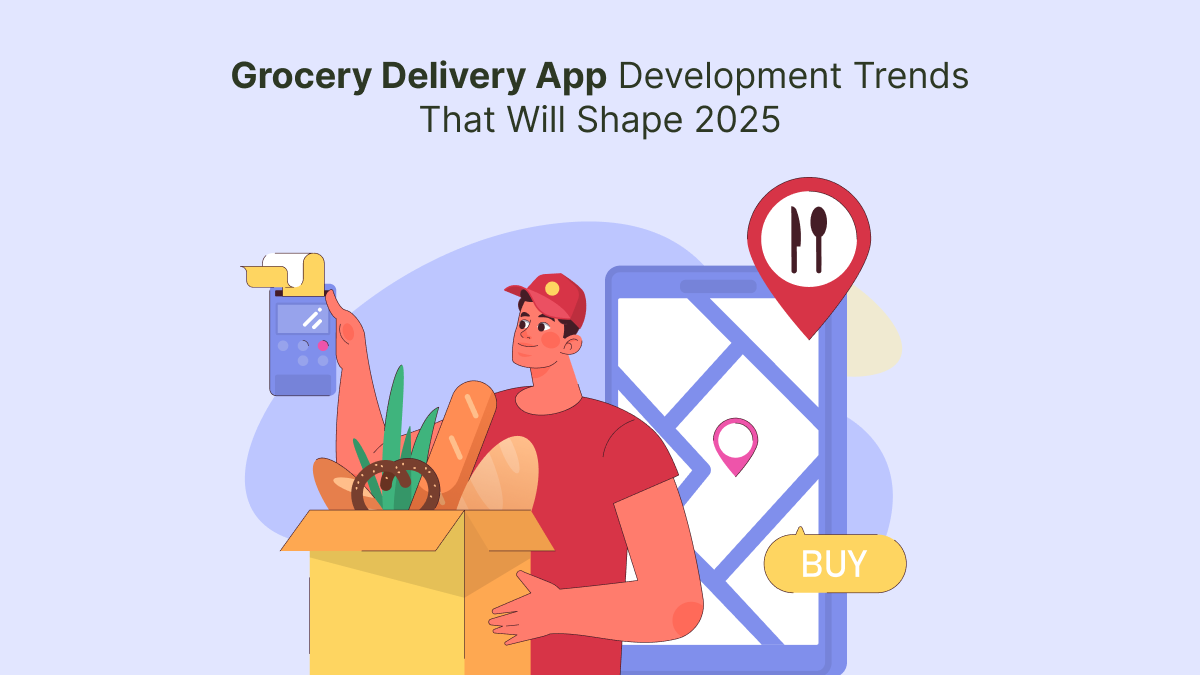Grocery Delivery App Development Trends That Will Shape 2025

In just a few short years, grocery delivery apps have gone from a niche convenience to a daily habit for millions. As we head into 2025, the grocery delivery space is evolving faster than ever. Businesses are no longer asking if they should build an app—they’re asking how to stay ahead.
This blog will guide you through the most important trends in grocery delivery app development to watch for in 2025, especially if you're thinking about building one or improving your existing solution.
Why Watch These Trends?
Because customer expectations are changing. New technology, rising competition, and shifts in shopping behavior mean your app needs to do more than just deliver groceries. It needs to be smart, efficient, and tailored for the next generation of users.
Key Trends Shaping Grocery Delivery Apps in 2025
Smarter Personalization with AI and Machine Learning
Apps in 2025 won't just show items based on category—they'll predict what each user needs before they even search. From suggesting frequent purchases to sending reminders when pantry items run low, personalization will drive higher engagement and repeat orders.
Rapid Delivery Options
Fast is no longer fast enough. The demand for 10 to 30-minute delivery will continue to grow, especially in urban areas. App developers will need to focus on better route optimization, local micro-warehouses, and tighter store-to-door integration to keep up.
Voice Search and Smart Assistant Integration
Customers will expect to speak their grocery list into their phones or even smart home devices. Integrating voice commands and syncing with virtual assistants will become a must-have for hands-free convenience.
Eco-Friendly Features and Sustainable Delivery Options
Shoppers care about the planet. Apps will start to show carbon footprint details, offer reusable packaging options, and let users choose “eco-friendly delivery” windows. These additions won’t just be ethical—they’ll be a selling point.
Multi-Vendor and Hyperlocal Marketplace Models
Apps will evolve into platforms—offering products from multiple stores, farmers, and specialty sellers in one place. This gives users more choice and supports local businesses. Hyperlocal delivery models are especially appealing in smaller cities and towns.
Subscription and Loyalty Programs
Building long-term relationships will be key. More apps will offer monthly subscriptions for free delivery, early access to deals, or personalized bundles. Loyalty programs that reward users for frequent purchases or green choices will boost retention.
Integrated Payment Flexibility
Payments will get easier and more flexible. Expect increased adoption of UPI, one-tap payments, buy-now-pay-later options, and even crypto in certain regions. The more seamless the checkout, the higher the conversion.
Read More: What is Blinkit? Business Model, Revenue Streams and More
Data Security and Privacy as a Competitive Edge
As privacy becomes a growing concern, apps that clearly show how they protect user data and offer strong security measures will gain trust—and market share.
AR Shopping and Smart Navigation
Augmented reality will play a bigger role in app design. From virtual product placement to visualizing items before purchase, AR helps enhance the at-home shopping feel. Some apps may even guide delivery agents using AR-powered navigation.
What This Means for Businesses
Grocery delivery app development is no longer just about getting from A to B. It’s about creating an entire ecosystem that feels intuitive, fast, and personalized. Companies that adapt to these trends early will not only survive—they'll lead the market.
Whether you're building a new grocery app or improving an old one, keeping up with 2025’s trends will help you create a better user experience and stay competitive in a busy space.
Frequently Asked Questions
How are grocery delivery apps different in 2025?
They’re smarter, faster, and more user-focused. Features like voice search, AI-based personalization, and eco-friendly delivery options are now expected by users, not just extras.
Do I need advanced tech for my grocery delivery app to succeed?
Not necessarily at first—but to scale in 2025, you’ll need tech that supports fast delivery, automation, and real-time updates. Start simple, but plan for growth.
Will users care about sustainability features?
Yes, especially Gen Z and millennial customers. Eco-delivery options, reusable packaging, and support for local sellers all matter more than ever.
How can I keep customers coming back?
Offer value beyond the first order. Loyalty rewards, personalized offers, and subscription perks keep users engaged and turn occasional buyers into loyal ones.
Should I develop an app for a specific city or go nationwide?
Start small and local if you’re just launching. Focused efforts help you build trust and deliver better service. Once your model is solid, expansion is much easier.
Conclusion
The grocery delivery space is entering an exciting new phase in 2025. As customer demands shift and technology opens up new possibilities, staying ahead of the curve is what separates a good app from a great one. If you're serious about launching or scaling in this market, partnering with an experienced app development company will help you blend innovation with practicality—and stay one step ahead of the competition.
- grocery_delivery_app
- readymade_grocery_delivery_script
- grocery_delivery_clone_script
- grocery_delivery_app_development
- grocery_delivery_app_development_company
- grocery_delivery_app_solution
- on-demand_grocery_delivery_app
- on_demand_grocery_app_development
- uber_for_grocery_delivery
- grocery_clone_script
- Questions and Answers
- Opinion
- Motivational and Inspiring Story
- Technology
- Live and Let live
- Focus
- Geopolitics
- Military-Arms/Equipment
- Güvenlik
- Economy/Economic
- Beasts of Nations
- Machine Tools-The “Mother Industry”
- Art
- Causes
- Crafts
- Dance
- Drinks
- Film/Movie
- Fitness
- Food
- Oyunlar
- Gardening
- Health
- Home
- Literature
- Music
- Networking
- Other
- Party
- Religion
- Shopping
- Sports
- Theater
- Health and Wellness
- News
- Culture

